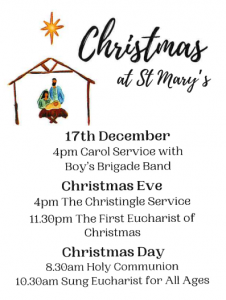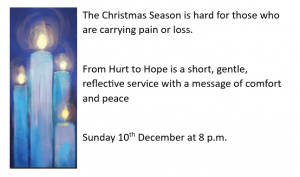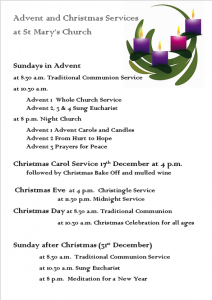Posted by Revd Nerys Brown on 28th January 2024 A Happy New Year to you all! Since this is the first magazine of 2024, I assume that it is not too late to use this greeting. I hope that it is not too late either to encourage you to make one more New Year’s resolution and to join me in seeking to try new things this year. I read an article recently claiming that trying new things can transform our lives for the better. It can help us discover our strengths and weaknesses, overcome our fears, build our confidence, boost our creativity and grow as people.
Here at St Mary’s we aim to offer a variety of Sunday services. If you have been attending the morning services regularly for a number of years, the liturgy will be comfortingly familiar. We also seek to provide services that are different and new, particularly at Night Church. We hope that these might teach us new ways of approaching prayer and worship and challenge us to think afresh about our faith and the way we live it out.
This month at Night Church, Ruth Burgess will lead us in a celebration of the ancient festival of Candlemas, Iain Goring, inspired by the author Richard Foster, will reflect on spiritual disciplines, and Kate Sainsbury will share with us a year in the life of the Appletree Community which she has founded to support her son Louis. This month also, we will mark the beginning of Lent with services in the morning and the evening of Ash Wednesday, 14th February. If you haven’t observed Lent before, what about coming to one of these or to the whole church service on the first Sunday of the season to find out more?
You are also invited to come together to mark Shrove Tuesday with pancake events in the church hall on the afternoon or evening of 13th February. These will be the first in a series of social events to which you are encouraged to invite relatives, friends or neighbours. Please consider who you might ask to come with you either to the afternoon gathering or to the supper – details below.
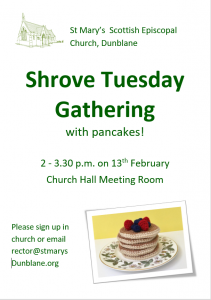 
The Gospel we’ll be using in our eucharistic services during 2024 is the Gospel of Mark, the earliest and probably the most puzzling of the four Gospels. It is also the shortest, possibly designed to be read aloud in one sitting of a church community. Some of you have already agreed to meet this month to read the whole of this Gospel together. It is not too late to sign up for a morning, afternoon or evening session in the Rectory or in someone’s home. Hearing the Gospel in this new way can be a powerful experience. It may lead to further gatherings to look in detail at various aspects of Mark and explore its themes. We’ll have to wait and see!
At St Mary’s we also offer opportunities to meet regularly in groups during the week to discuss and pray together and get to know each other. If you would like to find out about the Monday Gathering, the Men’s Group, the Young Adults Group, the Prayer Group, Sensible Shoes and The Chosen, please get in touch with the organisers, some of whose contact details are at the back of the magazine, or with me. A new home group will soon be launched which will hopefully bring together Christians from different churches in Dunblane to pray and learn together and provide support for one another. This may be the new thing for you to try this year! If so, I urge you to come to the introductory meeting or failing that, to contact Martin or Jill Wisher to find out more.
Meeting to worship and to work for good causes along with members of other local churches has always been an important part of the life of St Mary’s. This year, it’s our turn to host the World Day of Prayer in Dunblane. If you haven’t attended this service before, what about coming along to join in the world-wide wave of prayer and to hear a powerful message from the Christian women of Palestine?
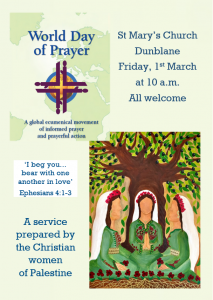
St Mary’s is also part of the Diocese of St Andrews, Dunkeld and Dunblane, a group of about 50 churches under the authority of Bishop Ian Paton. During the year there will be opportunities to meet with members of our sister churches for services and for other activities like the walks detailed below, organised by our Pilgrim Pastor, Duncan Weaver, along the Fife Pilgrim Way.

This month also, there will be a special Diocesan Evensong to welcome Bishop Marinez of Amazonia and celebrate our new link with her diocese in Brazil. This will be a great opportunity for some of you to visit our cathedral in Perth for the first time and to find out about what may turn out to be an exciting new project for our church.

In the meantime, please consider what other new things we could offer this year to build up our church community and strengthen our links with the wider world. I would be delighted to hear from you!
with love,
Nerys
Nerys writes: The repentant Jonah fresh from the belly of the whale, the psalmist beset by enemies, Paul, writing at a time of great pressure from imperial Rome, and Jesus, starting his ministry under the shadow of John’s arrest – in each of our readings today – Jonah 3.1-5, 10, Psalm 62.5-12, 1 Corinthians 7.29-31 and Mark 1.14-20 – we hear of a response to a call to God at a time of crisis.
It is often when we are in crisis that we turn to God, seeking God’s wisdom or guidance, comfort or strength. We trust that God will hear our calls of distress even when they come out of the blue, but will we recognise God’s voice when God responds to our plea? As the Vicar of Soham said in the wake of the murder of two schoolgirls in his parish many years ago now, when we’re drowning is not the best time to start learning to swim. Getting to know God’s voice takes practice. It is a lifetime’s work.
Our Gospel today is the first in a series of passages from the Gospel of Mark which will take us to the middle of Lent. I would like to encourage you to take time over the next few weeks to get to know God’s voice a little better by allowing God to speak to you through this Gospel.
Mark’s Gospel is a Gospel written at a time of crisis. Scholars think that it was produced either just after or just before AD 70, one of the most traumatic dates in the early history of the Jewish people. It was the year when Jerusalem was attacked and captured by the Roman army after a siege. Over a million people were killed and almost 100, 000 enslaved, the Temple was destroyed and the whole country laid waste. In its opening sentence, this work is described as an evangelion, a Greek word used for an important public announcement about a significant event which would change people’s lives for the better. It is a message of good news about someone called ‘Jesus Christ (Jesus the Messiah), the son of God’ . This was someone whose coming was prophesied by Isaiah and proclaimed by John the Baptist. This was someone who came to Galilee announcing a regime change. God’s kingdom is at hand. It is time to change the way we think and the way we live our lives.
The narrative forges ahead with breathless urgency and excitement. It is written in the style of the popular storyteller as a series of anecdotes vividly told, with short sentences strung together, the word ‘immediately’ appearing time and time again moving the action swiftly and jerkily along. This is not a Gospel to be read slowly, chewing on every morsel. In fact, it was probably intended to be listened to in single session.
When we read it like this, we can imagine the disconcerting and exhilarating impact this Gospel had on those who first heard it, and we can begin to understand what its author is seeking to do. For hundreds of years, Mark was felt by the Church to be inferior to the other three Gospels which are written in a more sophisticated style and present in more detail the teaching of Jesus. It was only in the nineteenth century that it was discovered that Mark wasn’t an abridged version of Matthew but the earliest surviving record of the life and teaching of Jesus. And it is only in the last hundred years that scholars have realised that it is not simple or naïve but ‘shot through with deeply theological perspectives’, to use the words of Rowan Williams.
It is when we read or listen to it from beginning to end that we notice, that although Mark is the shortest of the four Gospels it consistently provides much more detailed descriptions of events than Matthew and Luke. In the account of the feeding of the five thousand, for example, Mark tells us that the grass the people were sitting on was green. This little detail which indicates what time of year the miracle happened, not only makes the story more vivid but also according to some scholars, suggests that it is based on an eyewitness account of the event. The identity of Mark has been lost in the mists of time, but there is an ancient tradition that he was the secretary of St Peter. This was recorded early in the second century by a bishop who had learnt it from his churches in Asia Minor. According to this tradition, Mark not only wrote down but also interpreted what Peter had said to him, so that it would be accessible to new hearers and readers.
It is when we read the Gospel from beginning to end that we begin to see the great skill and artistry behind the presentation of this series of apparently simple stories. Threads of continuity come to light and we notice repeated behaviour in the three groups of characters who appear regularly in the story. The religious authorities – priests, scribes, Pharisees and Sadducees – are suspicious, sceptical and argumentative opposed to Jesus from the start. The crowd which appears more consistently in Mark than in the other Gospels, is impressed by his teaching and his miracles but its members never seem able to take a step beyond expressing wonder and amazement. The disciples follow Jesus but never really grasp who he is and what he had come to do. It is only the ragbag collection of people in crisis – like the man possessed by demons, the woman who is haemorrhaging blood, Jairus whose daughter had died, the Syrophoenician woman or the blind man from Bethsaida – who recognise him as the Christ, the Son of God, and call out to him for help. The way Mark portrays these characters doesn’t just draw us into the story but challenges us to respond ourselves to Jesus from amidst the crises of our lives and our times.
I urge you to sign up to meet with others in the congregation to hear Mark’s message of good news read in a single session, or failing that, to set aside an hour and a half sometime in the next few weeks to read it through yourself. Allow this ancient little book to work on you, to bring you closer to Jesus so that you will better recognise God’s voice.
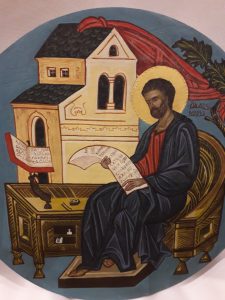
An icon of St Mark written by Diana, late wife of Hugh Grant.
Posted by Revd Nerys Brown on 19th January 2024 St Mary’s is hosting the World Day of Prayer for Dunblane this year.

Nerys writes: A few weeks ago, Peter was telling us that Advent was his favourite season in the church year. I think that I prefer this season of Epiphany which starts on such a dramatic note with the revelation of Christ to the wise men and contains such a rich and varied selection of readings, culminating in the mountain-top revelation of Christ to his disciples on the last Sunday before Lent.
This week’s passages present us with a tapestry of images of the One who seeks us out, draws close to us, inhabits us and calls us to service.
In our Old Testament passage, 1 Samuel 3.1-10, we read of the boy Samuel ministering to God even though he did not yet know God. ‘Go, lie down’, Eli says to him, ‘and if he calls you, you shall say, “Speak, Lord, for your servant is listening.”’
‘O Lord, you have searched me and known me’, the poet prays in Psalm 139. ‘You know when I sit down and when I rise up; you discern my thoughts from afar. Even before a word is on my tongue, O Lord, you know it completely.’
‘Do you not know that your bodies are members of Christ?’ Paul asks in 1 Corinthians 6.12-20. ‘Do you not know … that anyone united to the Lord becomes one spirit with him?’
“How did you come to know me?” Nathanael asks Jesus in our Gospel, John 1.43-51.
Again and again the word know appears, reminding us of God’s desire to know us, and for us to know God. At the beginning of this season of Epiphany, a season whose focus is on the revelations of God in Scripture, I think it is worth taking some time to ask what do we mean and how do we feel, when we talk of God knowing us and of us knowing God.
In English, ‘to know’ has a very wide range of meanings that require two or more verbs in other languages. In my native Welsh we have gwybod and adnabod, in French we have connaitre and savoir, in German we have wissen, kennen and erkennen. Some of you will know of other languages, like Spanish and Italian where a similar distinction is made between knowing a person or a thing and knowing a fact.

Our psalm for today is a celebration of all aspects of God’s knowledge of us. It tells us in detail how we are known completely by God. Wherever the psalmist goes, whatever he says and thinks, all is known to God. No detail in his everyday life is too small for God not to know about. This is a wonderful mystery according to the psalmist, but I wonder how thinking about it makes you feel?
In our age of widespread surveillance, the idea that we can’t escape from God’s knowledge of us may feel threatening. But if we are anxious or even frightened by the thought of an all-knowing God, we are missing the point of the psalm. The Hebrew word for ‘know’ has an even wider range of meanings than the English and includes the sense of having an intimate relationship with someone. To be known by God is to be loved by God. When we get to know God, we learn that God is not an intruder invading our privacy by stealth or by force. Neither is God’s persistent presence with us designed to keep track of everything we do wrong. God’s deepest desire is not to control us, but to invite us to know the unlimited and unconditional love that God is.
Rather than being a threat, being known by God is a great comfort to the psalmist. When we have an awareness of the presence of God who has known us from the moment of our conception, who is familiar with every aspect of our lives, who understands us better than we understand ourselves, we never need to feel alone. There can be times when we’re suffering the loss of a loved one or experiencing pain or battling illness when we feel that no one fully understand what we are going through. With God there are no moments, however dark, which we need to face alone. There is nothing, no hurt or trauma, no disappointment or shame, in our lives that God isn’t concerned about. God knows the story of our lives. God is aware of the sources of our fear or anger or guilt and understands what they are doing to us and what they are doing to others.
When we allow God to be intimately involved in our lives, accepting as Paul does, that our bodies are not our own but are temples of God’s Spirit, members of Christ’s body, God can use this knowledge of us to protect us and care for us. This is the psalmist’s experience. ‘ You have hedged (or enclosed) me’ he says – the Hebrew verb deriving from a word often used of a military fortification. ‘You have laid your hand upon me’. Knowing that God’s love is working for good in our lives frees us to work for the good of others.
I find it reassuring that God knows all about us and understands us before he calls us. When I look back at my life, I remember a time when, like Samuel, I didn’t know God but I can see now that God already knew me well and that God used that knowledge of me and those around me in order to draw me close enough to hear God’s voice. We are told that Samuel did not yet know God but through his mother’s prayers he had been placed in God’s house under the tutelage of someone who could guide him and teach him God’s ways, and on that fateful night helped him to recognise that it was God who was calling him.
We don’t know what Nathaniel was doing underneath the fig tree. Some scholars claim that he was studying the Torah, others that he was keeping alive an ancient dream of his people. The Chosen, a dramatization of Jesus’ life that some of us have been watching, has him sheltering there at a time of crisis in his life. Whatever it was that he was doing, Nathaniel, like the young Samuel, had made himself available to the God he did not yet know. A word of encouragement from Philip leads him to Jesus who only needs to refer to that moment under the tree for Nathaniel to know that he was known and to express his faith in the most unlikely of Messiahs. This was my experience too. After many years of making myself available to the God I didn’t yet know, I was invited by a friend to ‘come and see’. At that meeting, it was revealed to me that I was loved by God who knows me through and through. Something changed in me. I no longer merely knew about God but knew God through Jesus. I experienced his forgiving and healing love, and from that point my faith began to grow.
We are not told what happened to Nathaniel after that day but Jesus’ promise that he would ‘see greater things’ suggests that he would become a follower, witnessing the miraculous healings and signs recounted in the Gospel. For Samuel, God’s call to service followed swiftly on from his recognition of God’s voice. In a world that largely doesn’t yet know God, we who do know and love God have work to do. We are called to introduce others to Jesus like Philip did and to guide and support them as Eli did. I wonder how will we respond this week and through the course of this new year, to that call?
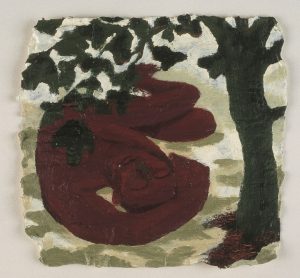
Mark Cazalet, ‘Nathaniel under the fig tree’ (Methodist Modern Art Collection)
Nerys writes: Yesterday morning, I tried very hard to prepare a sermon for our Midnight Eucharist but the words just wouldn’t come as they usually do. After several hours of grappling in vain with my thoughts, I heard two pings from my mobile phone. Two friends had sent me messages at the same time, one containing a poem, the other an image, both created in response to the horrors of the last few months. This confirmed to me what I already knew deep in my heart, that for me, this Christmas is not a time for talking but for holy silence as we come together to mark once more the coming of Christ, born into the rubble of the world which we have broken.
I invite you to join me in putting aside some time to read Thom Shuman’s poem and explore Kelly Latimer’s icon, using them as way into prayer this Christmas.
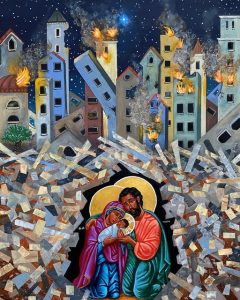
Kelly Latimer, Christ in the rubble
the creche is empty this year . . .
Mary is sitting with the mothers
whose children have been buried
under the rubble, weeping and wailing
together, arms wrapped around one
another in chronic grief
Joseph has put his tool belt
around his waist, slowly and tenderly
building as many coffins as he can
with the splintered pieces of
destroyed homes and buildings
the shepherds are sitting
the long line of aid trucks
just waiting for the signal
that they can begin driving
their trucks loaded with food,
medicine, fuel, and water for
the people in desperate need
the animals are tagging along
as best they can, trying to keep
up with the long line of families
who once more are turned into
displaced refugees from their land
and the angels have fallen silent,
cupping their hands to catch
the falling tears of the One
who sees beloved children
dying needlessly, while forgotten
(c) 2023 Thom M. Shuman
Nerys writes: During the last few weeks, I’ve been reading a book which I’m finding is sustaining me during what has turned out to be a difficult Advent in many ways. I don’t know about you, but for me it’s going to be hard to find much joy in our Christmas festivities this year. It doesn’t feel right to be carrying on as usual when there is such killing of innocent people happening in places like Gaza and in eastern Ukraine, when so many people have been driven from their homes by war and climate disasters and when there is so much economic need in our own communities. What I have learnt from this book, and what gives me hope in the face of the horror and terrible injustice of today, is that it was in a very similar circumstances that Christ was born.
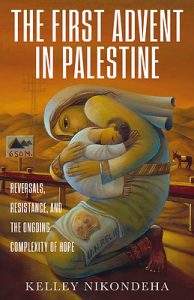
Over the years we have sanitized and prettyfied the Gospels’ account of the first Christmas until it bears little relation to its historical setting in first century Palestine and has little to offer anyone living in troubled times like ours. The book I’ve been reading sets the story in the political and economic landscape of the time – a time of darkness and danger for the Jewish people. For generations they had suffered at the hands of one empire or another and now they were under Roman rule. Caesar had announced the Pax Romana and had been declared the saviour of the world. Through crushing military victory and control maintained through violence, the Romans had ended the cycles of endless wars and brought about world peace. It was at this time that God who is love, came to the hills of Judea and to a village in Galilee to begin a different kind of peace campaign.
God first came to Zechariah, an ordinary priest, and his elderly, childless wife Elizabeth. God then reached towards Galilee to find someone to collaborate with in a plan for a kind of peace that didn’t rely on violence or war or on turning people out of their homes. While the Roman empire would soon collapse, God’s peace would be good news for oppressed people the world over for ever.
But the coming of the Messiah was nothing like any good first-century Jewish man or woman expected. No one anticipated the place or the person that God would approach – least of all Mary, the girl from Galilee.
The people of the north were considered inferior by those in Judea and Jerusalem. Over the centuries they had intermarried with other peoples, they didn’t observe the Jewish Law to the same extent as their southern neighbours and didn’t worship regularly in the temple. These villages were places of resistance to foreign rule – the people always waiting for the next act of aggression in a cycle of protests, uprisings and reprisals. This was the last place anyone expected to be on God’s map.
But it was to Nazareth in Galilee that God sent the angel Gabriel, to the last person you would expect – a local girl from an ordinary family. The Mary of our Christmas cards dressed in blue with her delicate beauty, calm and serene, is not the Mary of Luke’s Gospel. This girl on the verge of becoming a woman would have been shaped by trauma – the collective trauma of her people, humiliated and oppressed for centuries on end, and perhaps personal trauma, existing as she did in a precarious place where sexual violence against women and children was widespread. But a young woman like her, living at a time of great political tension which often spilled into violence, would also have been formed by resistance.
The author of the book I’ve been reading, likens Mary to members of the current generation of Palestinian women in the West Bank who refuse to accept the Israeli occupation. Women like Abed Al Tamimi, from the small village of Nabi Saleh, not unlike Nazareth, who at the age of 16 was arrested for slapping an Israeli soldier. She had grown up marching in community protests against the Israeli settlers who had taken over the village spring and much of their agricultural land. She was only ten when Mustafa, her cousin, was killed by soldiers. The following year, she witnessed the arrest of her mother (which she herself tried to stop) and then the arrest of her older brother. When soldiers came to her front yard just weeks after shooting another of her cousins in the face, she reacted with her fists. The next time the soldiers came, it was to take her to prison.

Before she became and adult, Abed Tamimi had developed a spine of steel. At the age of 22, she continues to resist the occupation, regularly risking her freedom and her life in her community’s quest for justice. Two thousand years earlier, Mary would have seen soldiers riding into Nazareth, terrorizing her neighbours in the name of peacekeeping. She would have witnessed uncles humiliated, cousins hurt and female relatives taken by force to be punished in unspeakable ways. While the men in her community took up arms to protect their lives and land, she might have composed songs of grand reversals and unlikely victories. Formed by trauma and resistance, she would have understood justice as rebellion against the oppression of the empire.
But before she herself could push against it with violence, Mary was pulled into God’s peace-making initiative. The angel insists that she has found favour with God. God’s Spirit would overshadow her body, and she would conceive the Son of God, a rival to Caesar, one who would be able to reshape the world according to justice, bringing a different kind of peace. Mary listens to the promise of the healing of so much hurt and responds with confidence borne of trust. The young rebel is ready to be at God’s service.
In the courtyard of the Church of the Annunciation built on the foundations of what is thought to have been Mary’s home in Nazareth, there is a collection of images from across the world. Most are the classic Madonna and Child motif but each reflects the nation of the artwork’s origin. Together they represent the ways in which Mary and her son continue to be embodied in those precarious places in the world where mothers are practicing non-violent resistance to oppression and teaching their children to hunger for justice and peace
May we in our prayers and actions support those who are continuing what Mary started with her ‘Yes’ to God, and in our own lives may we hold on to the hope which the coming of her son offers us in these dark days.

Kelly Latimore icon: Mother of God: Protectress of the Oppressed
ALMIGHTY God, give us grace that we may cast away the works of darkness, and put upon us the armour of light, now in the time of this mortal life, in which thy Son Jesus Christ came to visit us in great humility; that in the last day, when he shall come again in his glorious Majesty, to judge both the quick and the dead, we may rise to the life immortal; through him who liveth and reigneth with thee and the Holy Ghost, now and ever. Amen. (The Scottish Prayer Book)
Peter writes: This ancient prayer, the Collect for the first Sunday in Advent, is one of the great treasures of the Church. Read it out loud to yourself and listen to the way the language flows. Then notice the series of contrasts: “the works of darkness – the armour of light; now, in the time of this mortal life, in which thy Son came to visit us in great humility – in the last day, when he shall come again in his glorious Majesty; the quick and the dead.”
The word visit has changed its meaning. Here it does not mean dropping in for a cup of tea but to inspect, to inquire about. Advent is a time to cast light in the dark corners of our mind, our conscience and to reflect on the fact that the world is a dark place. We are reminded that we shall be called to account. But we can have confidence that the judge is merciful and that we shall rise to life immortal. All the great themes of Advent are gathered (“collected”) in this wonderful prayer.
I am also a great fan of our 1982 Liturgy, especially the Eucharistic Prayer for Advent. In fact, In fact I spent the past two Advent seasons in churches where they use the English liturgy but I smuggled in (shh!) the Scottish prayer. Just as the collect looks back to Jesus’ presence with us in great humility as well as forward to the time when he shall come again in his glorious majesty, so, with its references to a creation, a kingdom given, yet still to come, the prayer speaks of past and future collapsed into a single present, into God’s timelessness. Indeed every time we celebrate the Eucharist our divisions of time into past, present and future are similarly transcended: we present our offering now and we look forward to the healing of a broken creation at the end of time, manifested to us in the present by the transformation of bread broken and wine poured out.
A third reason for loving the Advent season is the music. At this time of the year we sing some of the best hymns in the book, for instance Charles Wesley’s great Lo, he comes with clouds descending and the mediaeval O come, o come Emmanuel, with its haunting melody that speaks of waiting and longing together with a note of triumphant expectation. A more recent hymn is People, look East whose rather jaunty melody captures the atmosphere of growing excitement and the words remind us that Advent is a time of preparation: “Make your house [your mind, your soul] fair as you are able”. Best of all, although it is probably better suited to a choir than for congregational singing, is Bach’s great cantata Wachet auf! (Wake, o wake!). Here, “wake” refers to the need to be alert to the sign’s of Jesus’ presence in our daily lives as well as to the life to come at the end of time. As if that were not enough, since reading through today’s first lesson, O thou that tellest good tidings to Zion and other pieces of Handel’s Messiah have been going through my head.
No wonder, then, Advent is my favourite among the Church’s seasons. It is just a pity that it is so short and gets drowned out by carols. Enjoy the feast of Advent while you can!
For prayer and reflection
Read through the Advent collect and the Eucharistic Prayer II. (You will find it on the SEC website; follow the links Who we are: Publications: Liturgies: 1982 Scottish Liturgy).
Read them slowly and meditatively.
Ask yourself:
– where are there works of darkness in my life, in the world today? Pray for help, protection and guidance.
– where do you see signs of Christ’s transforming presence in my life or in the world in the form of words and deeds? Give thanks for them, pray for the people and organisations involved.
– in spite of, or perhaps because of, all that is going on, what does it mean to look forward with hope?
Posted by Revd Nerys Brown on 9th December 2023
Nerys writes:
It seems to me that Christmas is starting earlier every year. Today is Advent Sunday and I’ve already led a Christmas carol service, visited a Christmas craft fair and the Extravaganza, sung carols around a Christmas tree and eaten three mince pies! Perhaps 2023 with its brutal wars, the suffering caused by the effects of Climate Change and the economic after-effects of the pandemic has caused many of us to crave some semblance of joy. It is natural to want to turn our backs for a few weeks on all the devastation and desperation and focus instead on things that make us glad.

Carols at Cromlix
I find it fascinating, however, that in the calendar of the Church, before any moment of celebration there is a season of lament and penance. Advent precedes Christmas and Lent precedes Easter. Our church fathers and mothers understood that a night of doubt and weeping comes before a morning of true joy. This movement from darkness to light is at the very heart of our worship.
In today’s Old Testament reading, Isaiah 64.1-9, the prophet takes us from lament to hope on an emotional prayer journey. His oracle starts with complaint and protest. He appeals directly to God to ‘rend the heavens and come down’. He lays bare the truth of his own experience and that of his people, a nation devastated by years of oppression and exile, and in doing so he expresses his trust that God will hear his desperate call. The honesty of his prayer makes him vulnerable and open to inner change. Lament helps us to move forward with God to a place of hope.
The prophet recalls past times when God acted powerfully on behalf of his people: ‘when you did awesome deeds that we did not expect.’ In difficult times, I find it helpful to look back at my life and to remember how good God has been to me. I bring to mind the special people God has placed in my life, the doors God has opened for me, the unexpected strength and comfort God has given me. In his prayer, Isaiah not only reminds himself that he and his people have history with God but also reminds God that he has a history with us. On that basis, he appeals to God to provide for his people again. Moving from lament to hope requires conversations about the past.
It also requires deep reflection on our present relationship with God. Isaiah speaks of the way his people have fallen short in their commitment to ‘the one who works for those who wait for him’. It makes them feel unclean and worthless, he says, like a dirty rag or a leaf blown by the wind. Many of us carry a lot of baggage in our hearts which is not only weighing us down emotionally, but is distancing us from God. I find that it is good to share with God the things that are bothering me. We can trust God with the deepest and darkest secrets of our lives because we know that God cares for us and will not hurt us.
As it nears its conclusion, Isaiah’s prayer shifts from confession to an expression of trust in God. The prophet proclaims, ‘Yet you, Lord, are our father’, and calls on God to come and see about his children. St. Paul expresses the same deep trust in God’s faithfulness in today’s New Testament passage, 1 Corinthians 1.3-9, as he prays with confidence on behalf of the young Christian community in Corinth. Hope comes from our assurance that God is faithfully watching over us, ready to respond to the deep desires of our hearts.
In today’s Gospel passage, Mark 13.24-37, Mark’s Jesus presents us with three stories to remind us that, however bleak things get, he has not forgotten us and will never abandon us. He is always with us and will come again to put things right in our world. In the meantime, we wait trustingly, mindfully, hopefully and actively.
I wonder what form your Advent waiting will take this year? You may wish to use as a starting point for your reflection this Advent prayer written by Val King, Head of Christian Aid in Scotland.
Waiting is hard Lord.
We wait to hear news of peace with justice,
we wait to greet the day when all will have enough,
but we don’t wait passively.
As we wait again for your coming,
strengthen us in our resolve to work to make your kingdom come on earth.
Amen.
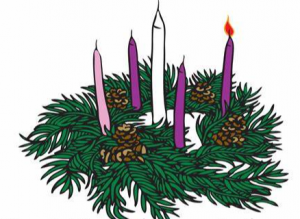
Posted by Revd Nerys Brown on 2nd December 2023
Posted by Revd Nerys Brown on 2nd December 2023
Nerys writes: I don’t know how many of you, like me, are looking forward to the final of the Great British Bake Off at the end of the month. I have been a fan of the programme for many years now. I am fascinated by the creativity which the challenges bring forth in the contestants and enjoy the suspense surrounding the adjudicating as, week by week, one baker after another is sent out of the tent. I read somewhere that a formula has been worked out to predict which of the competitors are most likely to win, based on their gender, age and where they come from, but I’ve noticed that it is often another more important factor that ensures success in this and other similar programmes. It’s the same quality that Jesus encourages in today’s Gospel, Matthew 25. 14-30.
The Parable of the Talents is often interpreted as a tale with a moral about investing our natural abilities, our skills, our resources in the service of God. But the more time I’ve spent reflecting on Matthew’s version of this story, the more I think it may be about something else. This is the second of two parables where Jesus says that he is giving his listeners a picture of what the kingdom of heaven will be like. The first story is about the relationship between ten bridesmaids and the bridegroom they are waiting for. This one is about the relationship between three slaves and their maverick master.
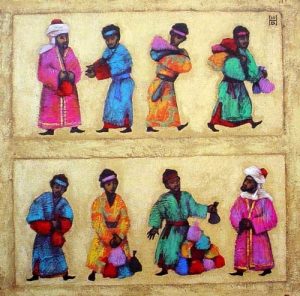
The Three Servants by Nelly Bube
The first two slaves who successfully invest their master’s money and are rewarded on his return, seem to act as a foil against which to compare the third who is a much more rounded character. It is his interaction with his master and his punishment which forms the climax of the story. We get to see the master through his eyes as a harsh man who takes what is not his and strikes fear in the hearts of those around him. In return, the master calls him wicked, lazy and worthless. But we get a more accurate picture of both characters if we focus on their actions rather than on their accusations of each other.
Far from being harsh and exploitative, the master acts in an extremely generous way, entrusting each of his slaves with a huge amount of money. (In the first century, a ‘talent’ would have been worth half a lifetime’s earnings for a day labourer.) Moreover, the master seems to know each his slaves well. He treats them with care and discretion, taking into account their capabilities so as not to impose an unreasonable burden on them. He doesn’t issue specific instructions for them to follow but gives them the freedom and the power to use their initiative. Then he goes away, giving them space so that they can act
independently of him. And far from reaping what he didn’t sow, he not only returns to the first two slaves the enormous wealth they had accumulated but also invites them to share with him his joy, transforming their relationship into one of friendship.
These slaves respond to his trust and his risky generosity by rising to the challenge unlike their colleague who returns exactly what was given to him, having buried his treasure in the ground. Despite his master’s characterisation of him, his actions show that the third slave isn’t a bad man. He doesn’t squander the money he was given or use it for his own benefit. In fact, in the first century what he does with it would be regarded as much more responsible than the risky speculating of the other two. He admits, though, that his actions are driven by his low regard of his master and it is this, I think, that leads to his downfall.
Time and time again in TV contests I’ve seen competitors being sent home for playing it safe rather than take a creative risk. Instead of regarding the judges as allies who wish to give them opportunities to shine, their fear of their criticism causes them to take a less challenging route. It appears that in the Kingdom of God as in the Bake Off tent, the greatest risk of all is not to risk anything. Paralyzed by his fear and distrust, the third servant rejects the opportunity the master graciously gives him to imitate his risky and trusting approach to life. Jesus’ warning is that the outcome of playing it safe, of not being ready to invest yourself or risk anything in response to God’s astounding generosity is like being banished to the outer darkness.
All our readings today remind us that what we think of God and how we respond to God’s call on our lives is important. We have real choices and power but there are consequences resulting from the ways we use our freedom. What we do or fail to do shapes our lives and our world.
Zephaniah’s prophecy in Zephaniah 1.7, 12-18, contains a relentless attack on those among the Israelites of his day who had a complacent attitude towards God – those who thought they could put God in a box and focus on living a materially comfortable life. They will know the consequences of their neglect of the poor, writes the prophet. To them, God will come as a hostile and destructive army, taking away all their security and giving them only terror.
Paul in 1 Thessalonians 5.1-11, has a similar message for those Christians in Thessalonica who were tempted to put their trust in living a quiet life under Roman rule. It was as if they were being lulled to sleep by the Empire’s comforting slogans of peace and security instead of living their lives fully and faithfully in the light of the Gospel.
Just as the three slaves were expected to imitate their master’s risky investment in them, we who have been entrusted with the good news of God’s Kingdom are called to be like our Lord Jesus. He told today’s story in the middle of his own personal high-risk response to God’s call, having left the safety of rural Galilee to go to Jerusalem, ready to invest all for the sake of Love.
Jesus invites us to join him on the adventure of faith, to care and trust so deeply that we too are ready to invest our lives riskily and completely for the sake of others. When we follow him like this, encouraging one another and building up each other on the way, this is what the kingdom of heaven will be like.
Nerys writes: There is something strangely appropriate about the fact that All Saints Sunday this year falls on Firework Night. For centuries, people have been using fireworks to commemorate saints. In the Philippines and Mexico, the feast days of the Blessed Virgin Mary are celebrated with fireworks, and on St John’s Day every year, there are displays all across Spain and Italy. St Catherine of Alexandria gave her name to a firework, the Catherine Wheel. On eve of her feast day in Malta, villages complete to hold the largest and most intricate displays.

I suppose the famous saints are a bit like fireworks. You could say that they are people who have brought great amazement and joy, although someone like John the Baptist was more like a banger, disturbing everybody with his lifestyle and his preaching! But I’m not sure that this the best comparison. Fireworks are great while they last, but they don’t last for long. When they go off, people often call out Ooooh! with excitement but we’ll soon hear an Aaah! of disappointment when the display finishes. And there’s nothing more depressing than coming across soggy firework cases in the grass the day after Bonfire night! I think St Paul has a better image in Philippians 2.14-18.
Paul, writing from the darkness of prison, encourages his friends at Philippi to keep on shining like the stars on a clear night, bringing happiness to others. Stars shine for a very long time. A star like our sun, for instance, will shine for about 10 billion years. And they keep on shining, even when clouds prevent us from seeing them from earth. Paul wants his friends to be constant like the stars, always doing their best to live in a way that reminds other people of Jesus. If we all did that, the world would be a very different place.
The Beatitudes of Jesus is a very familiar Gospel passage for many of us. I wonder if reading the translation sentence by sentence, interspersed with a paraphrase called The Message will help you to hear it in a different way today?
Matthew 5.1-12
When Jesus saw the crowds, he went up the mountain; and after he sat down, his disciples came to him. Then he began to speak, and taught them, saying:
‘Blessed are the poor in spirit, for theirs is the kingdom of heaven.
You’re blessed when you’re at the end of your rope.
With less of you there is more of God and his rule.
‘Blessed are those who mourn, for they will be comforted.
You’re blessed when you feel you’ve lost what is most dear to you.
Only then can you be embraced by the One most dear to you.
‘Blessed are the meek, for they will inherit the earth.
You’re blessed when you’re content with just who you are—no more, no less. That’s the moment you find yourselves proud owners of everything that can’t be bought.
‘Blessed are those who hunger and thirst for righteousness, for they will be filled.
You’re blessed when you’ve worked up a good appetite for God.
He’s food and drink in the best meal you’ll ever eat.
‘Blessed are the merciful, for they will receive mercy.
You’re blessed when you care.
At the moment of being ‘care-full,’ you find yourselves cared for.
‘Blessed are the pure in heart, for they will see God.
You’re blessed when you get your inside world—your mind and heart—put right.
Then you can see God in the outside world.
‘Blessed are the peacemakers, for they will be called children of God.
You’re blessed when you can show people how to cooperate instead of compete or fight. That’s when you discover who you really are, and your place in God’s family.
‘Blessed are those who are persecuted for righteousness’ sake, for theirs is the kingdom of heaven.
You’re blessed when your commitment to God provokes persecution.
The persecution drives you even deeper into God’s kingdom.
‘Blessed are you when people revile you and persecute you and utter all kinds of evil against you falsely on my account.
Not only that—count yourselves blessed every time people put you down or throw you out or speak lies about you to discredit me. What it means is that the truth is too close for comfort and they are uncomfortable.
Rejoice and be glad, for your reward is great in heaven, for in the same way they persecuted the prophets who were before you.
You can be glad when that happens—give a cheer, even!—for though they don’t like it, I do! And all heaven applauds. And know that you are in good company. My prophets and witnesses have always got into this kind of trouble.
I wonder if any phrase in particular jumped out at you as you were reading? Take a moment to think about it or to reflect on the whole passage.
‘Know that you are in good company’, says Jesus. Sometimes we feel that we are on our own as we try to live the way God wants us to. Paul must have felt very alone at times in prison, but he knew that his friends at Philippi were praying for him and that would have kept him going. One day last week, I had a feeling that a friend of mine in Wales I hadn’t spoken with for many weeks, was praying for me. It made a difference to how I felt that day. When I phoned her later in the week, she said that on that on that particular day I’d popped into her mind during her quiet time and she had indeed prayed for me. She was surprised that I had known and delighted that it had made a difference.
When we pray for one another, we are reminded that we are in good company as part of the Church here on earth and in heaven. The festival of All Saints is accompanied by that of All Souls when we remember ‘the faithful departed’, the ordinary people who may not have made a mark on the world like the saints did, but who made their mark on those of us who loved them. Those people are also loved by God who made them and who continues to hold them close. When we pray we join in with their prayers and those of the saints and the angels.
I invite you to take some time to remember and give thanks for those that you have loved and lost and to imagine them praying for you as you pray for others and for our broken world.

Image from https://pixabay.com/
Posted by Revd Nerys Brown on 31st October 2023 This Sunday evening at 6 p.m. we remember those we have loved and lost and pray for those who grieve.
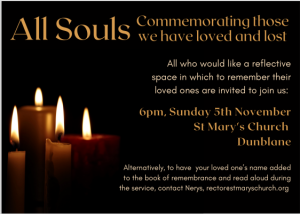

Nerys writes: I’m sure you’ve noticed that the word ‘amazing’ has changed its meaning in recent years and largely lost its power in everyday speech. Advertisements talk of ‘amazing prices’, ‘amazing quality’, ‘amazing colours’. Young people will say that they have been to ‘an amazing concert’, and heard ‘an amazing singer’. None of this has the sense of astonishment or bewilderment that is so often associated in the Gospels with Jesus. It is not surprising that his actions caused amazement, but his words also gave rise to a similar reaction. The multitude who heard the Sermon on the Mount, the crowds in the synagogue at Capernaum and in his home town of Nazareth, even his own parents overhearing him as a young boy in the temple – all were amazed at what he said and we find the same reaction in today’s Gospel reading, Matthew 22.15-22.
The Pharisees were confident that they had discovered a way get rid of this young man who was becoming such a thorn in their sides. They must have burnt a lot of midnight oil planning this trap. They had even joined with the followers of Herod – a group they bitterly opposed – to come up with a perfectly formulated question which would cause him to discredit himself by his own words before the large crowds of worshippers in the temple courts. Whichever way he answers their question, he is sure to alienate some of the crowd and find himself in big trouble. They think they’ve got him. They flatter him, trying to lull him into a false sense of security, before launching their attack.
Yet, within a few seconds, they are the ones scrabbling red-faced for answers to his questions, with their clever strategy completely destroyed. They are amazed – and shamed – by what they have heard from his lips and have no option but to scurry away with their tails between their legs.
What was it that Jesus had said this time that caused such amazement even among his enemies? Was he just clever with words, or did he speak some divine wisdom and truth that we also need to hear?
On the surface, the Pharisees’ question was to do with money. Is it right to pay taxes to Caesar or not? But there was much more to it than that. It wasn’t just that the people of Israel didn’t like paying taxes, or that this tax represented for them the oppression of foreign occupation. Devout Jews believed that using the Roman coin, the denarius, to pay the tax was idolatry, an offense against God.
This is why, before saying anything else, Jesus asks the Pharisees to bring him the coin in question, stamped with an image of the emperor’s head and inscribed around the edge with words that would send a shudder through any believer – Caesar, Son of God. This request is, in fact, the beginning of his answer because when these religious leaders produce the coin, they are admitting their hypocrisy, showing everyone that they themselves were handling the hated currency. ‘Whose is this image?’ Jesus asks. ‘And who is it who gives himself an inscription like that?’ He doesn’t say anything that could get him into trouble but the questions he throws back at them show very clearly what he thinks of Caesar’s presumption and of their complicity.
Well then, he continues, ‘you’d better pay Caesar back in his own coin’. What did he mean? Was he inciting a revolution or was he, as he stood there with the coin in his hand, simply saying that the tax should be paid? The deliberate ambiguity of these words is so clever.

The Tribute Money by Rubens
But then, almost as an afterthought, he adds ‘and you’d better pay God back in his own coin too.’ Amazement! With these words a new and completely different dimension is added to the question and the dilemma is resolved. The Pharisees are now looking like fools. They are meant to be experts in religion but they never thought to introduce God into the debate. If we give back to Caesar what is his, we need also to give back to God what is God’s – and every Jewish child would know what that meant. It was clear from the words they recited every morning and evening: Hear, O Israel: The LORD our God, is the only LORD. You shall love the LORD your God with all your heart and with all your soul and with all your might. The first duty of every Jew is to offer to God the worship, love and service of their whole lives as our psalm today, Psalm 99, makes clear. Caesar’s claims are as nothing before the all-embracing claim of the one true God.
Everyone is amazed. Once again, it appears that this young man knows more about their heavenly Father than all the religious leaders put together. And he has spoken with an authority which surely could only come from God himself. As the Pharisees leave with their anger and hatred undiminished, it doesn’t occur to them that Jesus’s response might be a last appeal by their God who loves them, for them to change their ways and turn back to him. They hadn’t wanted a real answer to their question, so they didn’t hear it in this way. But, if we look at the wider context, Matthew allows us to see the situation in a different light. He has carefully placed this episode after a series of parables about people who refuse to give God his due, who will not recognise his Son and rejoice with him.
So here we have the true Son of God, standing before us just days before he will give himself up to death. He isn’t interested in wriggling out of personal danger. He isn’t interested in leading a tax revolt. Jesus is on his way to embody God who is love, whose face was hidden from Moses but which will be unveiled at last and made known personally to all his children. He is on his way to defeat for ever through his self-giving love, the power of all the Caesars of this world by defeating once and for all the power of evil and death.
The risen Christ is standing before us this morning, asking us to consider afresh how we should respond to God, source of everything we enjoy including life itself. Will we turn away like the Pharisees or will we, like the young Christians addressed by Paul in today’s epistle, 1 Thessalonians 1.1-10, repay God by becoming imitators, sharing God’s love and goodness with everyone we meet? The choice is ours.
This week we are called to pray in particular for a just and sustainable peace in Israel and Palestine. You may wish to use this prayer issued by Christian Aid.
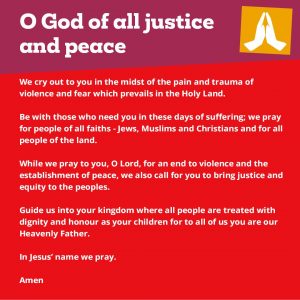
|












